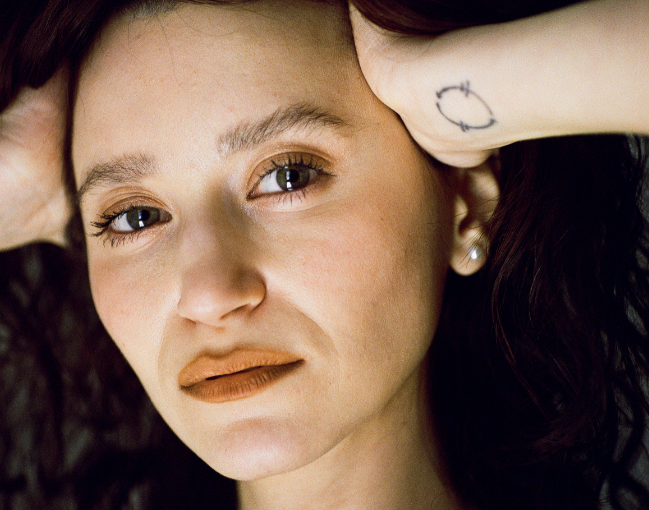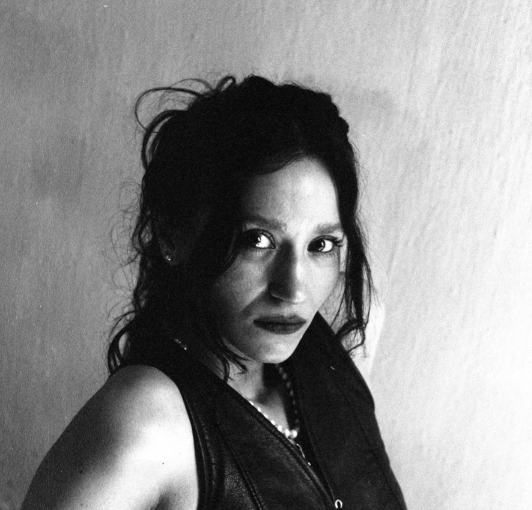Diana Azzuz is releasing EP Anastrophe via Standard Deviation on July 20, with the video for ‘Recursive Gesture’ premiering today via AQNB. It’s the artist’s debut record and her second project for the Kyiv-based label, following a 15-minute video work with Rina Priduvalova that explored digital worlds and dystopias.
Azzuz isn’t afraid to detail her perspectives on technology and cross-virtual worlds, informed by trips to see family across the Ukraine, Syria, and parts of the Middle East. The possibility of self-determination reveals itself online as opposed to the places of the artist’s upbringing that, as she explains, have been permanently altered by political conflict. However, Azzuz does not suggest retreating to the virtual, rather navigating both to pursue complete actualization.
**You recently shared a video of your time in Syria. Can you tell me a bit about that and your involvement there?
Diana Azzuz: Thanks for asking. I used to live in Syria when I was younger since my dad is from there, and then, after we moved back to Ukraine, I would visit my Middle Eastern family every other summer. It’s only recently that I’ve started to grasp the scale of the impact it had on me. I think it firmly shaped the idea of nostalgia and longing for something, the state of being in-between. For almost a decade, until 2019, I hadn’t been able to visit Syria because of the war. My dad moved to Libya in the 90s and he’s been working there ever since. When I think about it, the irony of it all is that all these countries, including Ukraine, where part of my family lives, are tormented by war, and that created some sort of complete disillusion for me.
**I’m interested in the idea of cross-virtual worlds you propose in your latest work. Can you explain what you mean by this? Can you describe them?

DA: It’s interesting how we see that virtual spaces are becoming an integrated coherent space or, possibly, a network, in opposition to how we used to see these worlds as random socio-cultural events with a certain cultural value.
Progress is somewhat equivalent to a process, because once something is done it becomes a definition of what you are, but I like to entertain the idea of fluidity, and using tools like AI, as opposed to working with just 3D like I did before, was compelling because I tried to show how a human being could self-modulate, self-morph almost literally, and actualize various states within time and space. I mean, we can even trace that in the ways we behave with different people, it’s like we turn on a certain regime of communication to adapt situationally and to the other person.
**The pandemic forced many of us into almost entirely virtual spaces. Now, we’re re-navigating these things as necessities as places begin to reopen. Would you agree? Does your work address this in any way?
DA: Generally, I would say that I’ve never been big on social life. As a teenager,I’d spend a huge amount of time on the internet. As you said, all of us were forced to switch to virtual spaces, and the pandemic drastically sped up that process. For me, it’s important to have that choice and know that I’m making it, rather than being “forced” to do something.
I’ve always been fascinated by the idea of how you can ‘navigate’ the digital world, how it’s intertwined with our lives offline, and how it changes the perception of the things you interact with. It has a lot of freedom but also can lead to a lack of responsibility, too, that manifests both online and offline.
Right now, I feel like we’re a bit displaced and fatigued, and so there is this need to find, for lack of a better word, a balance and attune ourselves with our self-actualizations in these spaces. So, I guess I have a fixation on seeing how we can regulate ourselves in a certain environment and have flexibility at the same time.

**Given the topic of virtuality and your background, does your understanding of geography intersect with this project at all?
DA: Not intentionally, but I believe that my coming from different backgrounds and having lived in different places predisposed me to a state of constantly figuring out ways of contextualizing and communicating with the things around me.
**I sense an attitude you have towards transience and existing outside certain binary expectations. If so, can you explain your perspective on these ideas?
DA: You’re right. In general, there’s always something repellent about having to stick to one form of expression, be it sound, imagery, or whatever, which gives the crowd an easy way of labeling you for doing one certain thing. In the past, I used to think that I had an issue with grading as in categorizing things, but after studying philosophy, critically looking at it, and eventually coming to terms with it, I see everything as a interlinked complex of phenomena that doesn’t necessarily agree with each other, but manifest itself in various ways.**
Diana Azzuz’s Anastrophe is out via Standard Deviation on July 20.













